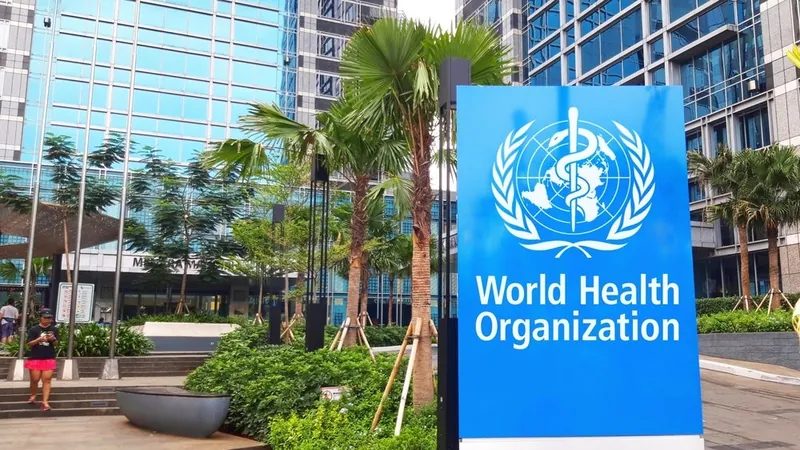
BREAKING: WHO Unveils Groundbreaking Lancet Papers Transforming Clinical Trials and Maternal Health!
2025-03-31
Author: Rajesh
In a recent announcement, the World Health Organization (WHO) has issued important papers published in The Lancet that promise to reshape the landscape of clinical trials, particularly concerning maternal and perinatal health. Dr. Teesta Dey, WHO Medical Consultant in Maternal and Perinatal Health, emphasized the urgent need for comprehensive research involving pregnant and lactating women. Alarmingly, Dr. Dey noted that a staggering 98% of medications used during pregnancy remain untested for safety and efficacy.
We lack sufficient data to ascertain if many medical products are safe or effective when used during pregnancy. This creates a significant burden for healthcare providers and leaves women grappling with difficult decisions regarding treatment risks and benefits," Dr. Dey stated. "The absence of this critical data often results in subpar care, with pregnant women potentially resorting to off-label medications without understanding their safety or effectiveness."
Empowering Primary Care: A Game Changer
Another pivotal discussion from the WHO guidance highlights the essential role of primary care in enhancing research opportunities. Dr. Chris Butler, a prominent author of a Lancet paper, shared insights on how robust primary healthcare can potentially unlock 75% of health advancements as countries strive to meet developmental goals.
“Primary healthcare is a comprehensive societal commitment, addressing broader determinants through multi-sector policies and actions. It empowers individuals to take charge of their health," Butler explained. He advocated for the establishment of a global primary care alliance, enhancing access to clinical trial research and amplifying the global research framework.
The Demand for Transparency and Collaboration
The subsequent papers stress the critical need for transparency among stakeholders. Dr. An-Wen Chun highlighted that only 50–67% of clinical trial results find their way into journals, with fewer than half being publicly accessible in registries. This lack of accountability poses significant challenges for healthcare advancement.
Chun outlined three vital recommendations to improve trial reporting transparency:
1. Timely Reporting: Trial investigators and sponsors must ensure that all results are reported in trial registries within 12 months, adhering to the WHO’s 2015 public disclosure guidelines.
2. Adequate Resources: Funders and governments should guarantee that trial registries are sufficiently resourced to comply with the new WHO guidance, featuring structured data fields and quality control measures.
3. Policy Enforcement: Relevant stakeholders, including funders, journals, and regulators, must implement policies that enforce adherence to WHO guidance and the reporting of newly recommended items related to summary results.
“By taking these steps, we can ensure the public has access to a complete body of evidence from clinical trials that is crucial for improving patient care and bolstering global health,” Chun advocated.
Streamlining Ethics and Regulatory Approvals
Dr. Marco Cavaleri from the European Medicines Agency (EMA) shared insights on the ethics and regulatory dimensions of global clinical trials in a paper titled "A roadmap for fostering timely regulatory and ethics approvals of international clinical trials in support of global health research systems."
Cavaleri proposed the establishment of a single ethics committee per country to streamline the approval process for clinical trials, increasing efficiency while still recognizing the need for local committees to play a complementary role. "Streamlining this process will ensure ethical reviews are quick yet thorough, ultimately protecting trial participants," he asserted.
Addressing Funding Deficits in Global Health Research
In light of these developments, the WHO has also raised alarms regarding insufficient funding for critical research areas like tuberculosis (TB) following recent funding cuts from the United States. With many resources flowing toward low- and middle-income countries, there is an urgent call for reconsideration of funding strategies to support research into TB, HIV, and other pressing global health issues.
These revelations from the WHO’s latest Lancet papers highlight the pressing need for innovation in clinical trial methodologies and a unified approach toward improving maternal health. As stakeholders come together to embrace these recommendations, a new era of ethical and effective clinical research may soon be on the horizon, transforming lives and saving millions in the process.
Stay tuned for more updates on this evolving story!




 Brasil (PT)
Brasil (PT)
 Canada (EN)
Canada (EN)
 Chile (ES)
Chile (ES)
 Česko (CS)
Česko (CS)
 대한민국 (KO)
대한민국 (KO)
 España (ES)
España (ES)
 France (FR)
France (FR)
 Hong Kong (EN)
Hong Kong (EN)
 Italia (IT)
Italia (IT)
 日本 (JA)
日本 (JA)
 Magyarország (HU)
Magyarország (HU)
 Norge (NO)
Norge (NO)
 Polska (PL)
Polska (PL)
 Schweiz (DE)
Schweiz (DE)
 Singapore (EN)
Singapore (EN)
 Sverige (SV)
Sverige (SV)
 Suomi (FI)
Suomi (FI)
 Türkiye (TR)
Türkiye (TR)
 الإمارات العربية المتحدة (AR)
الإمارات العربية المتحدة (AR)